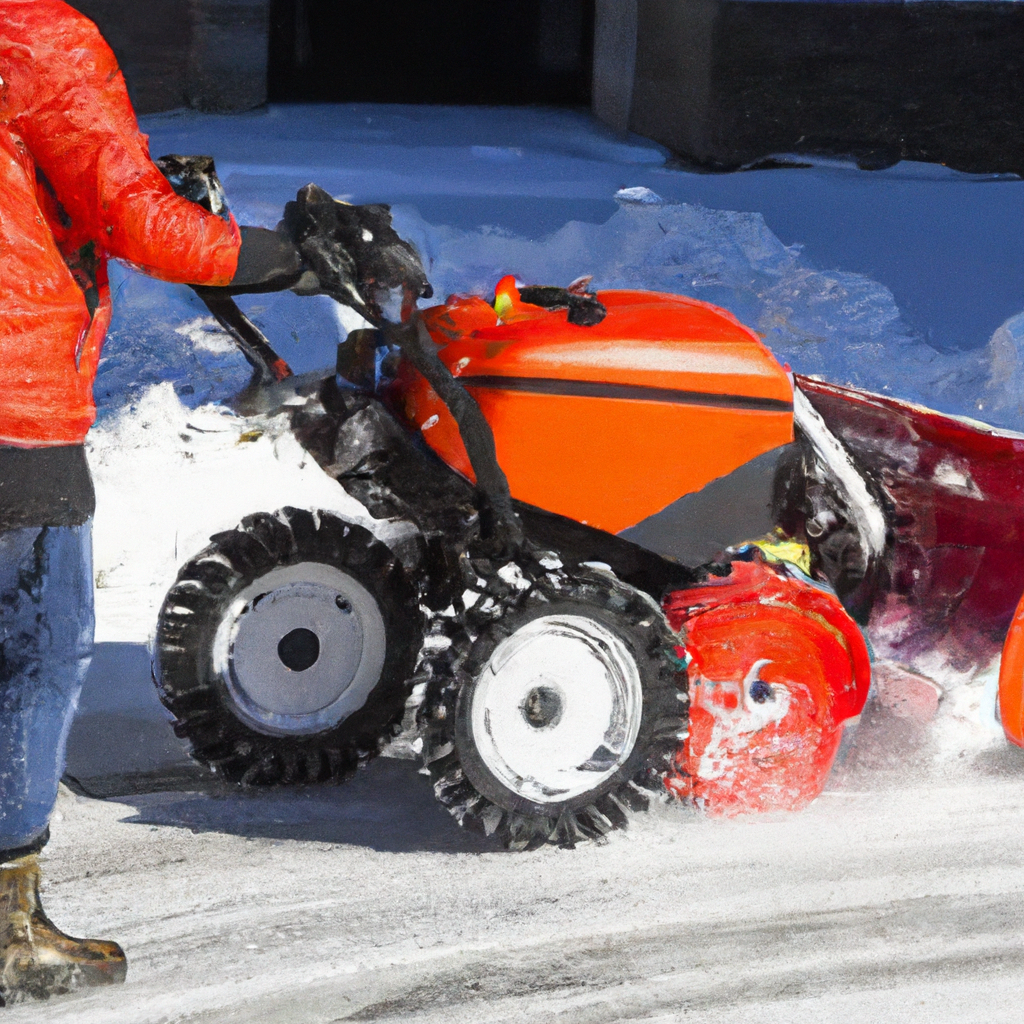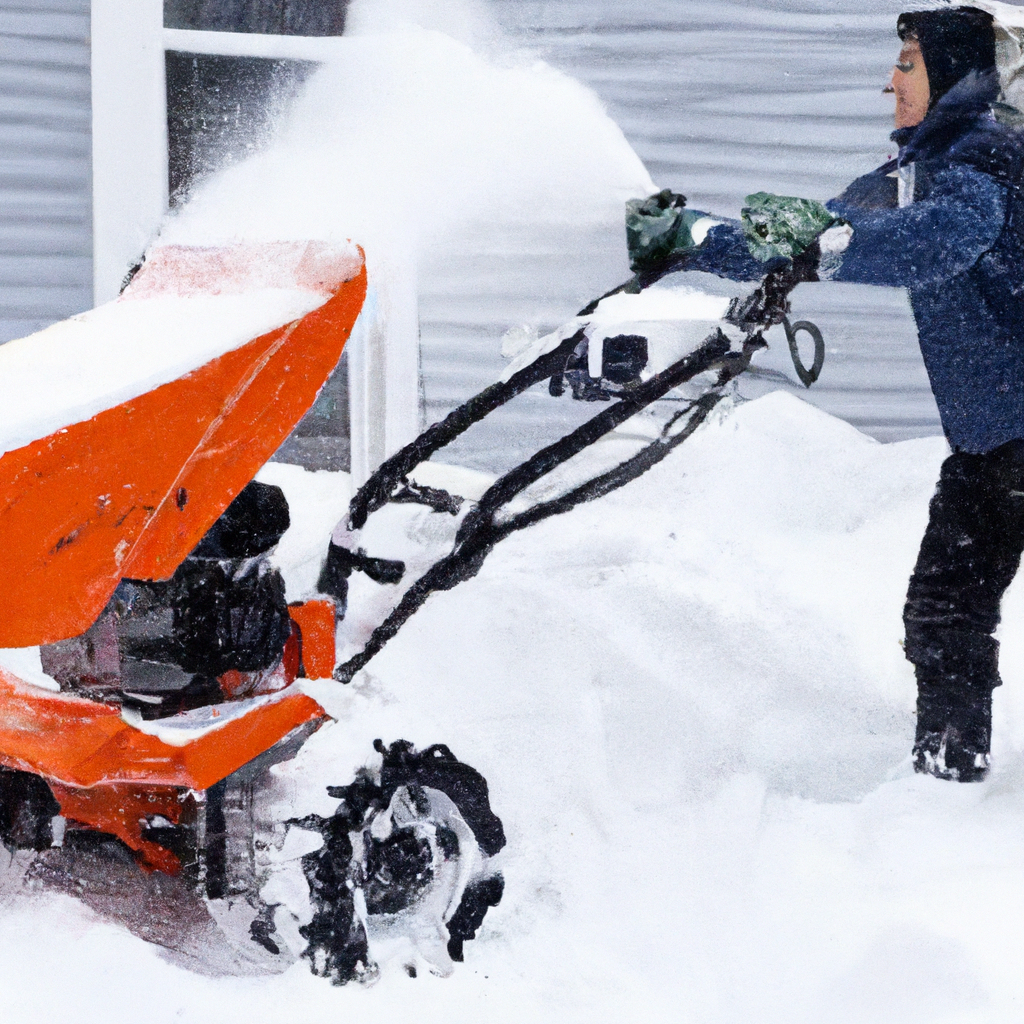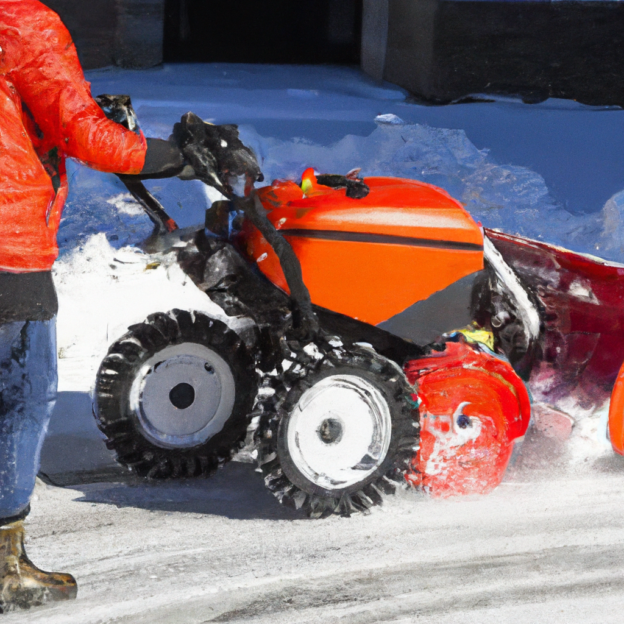If you’ve ever operated a snowblower, you know the deafening noise it can create, making it a less-than-pleasant experience for both you and your neighbors. But fear not, there are ways to hush that noisy snow-clearing machine! In this article, we’ll walk you through some practical tips and tricks that will help you reduce the noise level of your snowblower, ensuring a quieter and more enjoyable snow removal process for everyone involved. So get ready to tackle that winter wonderland without waking up the entire neighborhood!

Regular Maintenance
Oil Change
One of the most important steps in reducing the noise level of your snowblower is to perform regular oil changes. Over time, the oil in your snowblower can become dirty and lose its effectiveness, leading to increased noise and vibrations. By changing the oil at the recommended intervals, you can ensure that your snowblower’s engine runs smoothly and quietly.
Air Filter Cleaning
A clean air filter is crucial for the proper operation of your snowblower and can also contribute to reducing noise levels. Over time, the air filter can become clogged with dirt, debris, and dust, restricting airflow and causing the engine to work harder. By regularly cleaning or replacing the air filter, you can maintain optimal engine performance and minimize noise.
Spark Plug Replacement
Worn-out spark plugs can cause your snowblower engine to misfire, resulting in increased noise levels. By replacing the spark plugs at the recommended intervals, usually annually or after a certain number of operating hours, you can ensure that your snowblower runs smoothly and quietly.
Belts and Pulleys Check
Loose or worn-out belts and pulleys can not only affect the performance of your snowblower but also contribute to increased noise levels. Regularly inspecting and tightening the belts, as well as checking for signs of wear on the pulleys, can help minimize noise and vibrations.
Tighten Loose Bolts
Over time, the vibrations and constant use of a snowblower can cause bolts to become loose. Loose bolts can create additional noise and may even compromise the overall stability of the machine. By taking the time to inspect and tighten all the bolts regularly, you can reduce unnecessary noise and ensure safe operation.
Proper Operation Practices
Avoid High Speeds
Operating your snowblower at high speeds can significantly increase noise levels. Instead of rushing through the snow-clearing process, try adjusting your pace to a slower speed. Not only will this help reduce noise, but it will also allow the snowblower to work more efficiently.
Use Proper Technique
Using the correct technique while operating your snowblower can also make a difference in noise levels. Instead of forcing the machine through heavy snow, let the snowblower do the work by allowing it to move forward at its own pace. This will not only reduce noise but also prevent unnecessary strain on the engine.
Avoid Overly Dry or Wet Snow
Operating your snowblower in extremely dry or wet snow conditions can increase noise levels. Dry snow can clog the auger and force the machine to work harder, while wet snow can put extra strain on the engine and lead to increased noise. Wait for the snow to reach a desirable moisture level before using your snowblower to reduce noise levels.
Avoid Overloading the Machine
While it may be tempting to push your snowblower to its limits, overloading the machine can cause excessive noise and decrease its lifespan. If the snowfall is particularly heavy, consider making multiple passes instead of trying to remove all the snow in one go. This will not only reduce noise but also ensure the longevity of your snowblower.
Noise Reduction Accessories
Muffler Upgrade
Upgrading the muffler on your snowblower can significantly reduce noise levels. Look for a high-quality muffler specifically designed for your snowblower model. With a properly functioning muffler, the exhaust noise can be greatly reduced, making your snowblower quieter and more enjoyable to use.
Noise Reduction Pads
Another effective way to reduce noise is by using noise reduction pads on your snowblower. These pads are designed to absorb vibrations and dampen the overall noise produced by the machine. Simply attach them to the areas where noise is most prominent, such as the engine assembly or the body of the snowblower, to enjoy a quieter snow-clearing experience.
Insulated Snow Cab
If noise reduction is a top priority for you, consider investing in an insulated snow cab. These cabs provide a shielded enclosure for the operator, effectively reducing noise levels and keeping you protected from wind and snow. Not only will an insulated snow cab make your snowblower quieter, but it will also provide added comfort during those long winter days.
Vibration Dampening
Excessive vibrations can contribute to the overall noise levels of your snowblower. To reduce vibrations and subsequently reduce noise, consider attaching vibration dampening pads to key areas of the machine. These pads absorb vibrations and create a smoother operation, resulting in a quieter and more pleasant snow-clearing experience.

Choose a Quieter Snowblower Model
Compare Noise Levels
When shopping for a snowblower, it is important to compare noise levels between different models. Look for models that are specifically designed for noise reduction and have lower decibel ratings. Manufacturers often provide noise level information in the product specifications or user manuals, allowing you to make an informed decision.
Consider Electric Snowblowers
Electric snowblowers tend to be quieter than their gas-powered counterparts. Since electric snowblowers do not have an internal combustion engine, they produce less noise and vibration. Consider switching to an electric snowblower to enjoy a quieter snow-clearing experience without compromising performance.
Look for Rubber Auger Paddles
Some snowblower models come with rubber auger paddles instead of metal ones. Rubber auger paddles not only provide superior performance in terms of clearing snow but also contribute to noise reduction. As they make contact with the ground and the snow, they produce less noise compared to metal auger paddles.
Check for Noise-reducing Technologies
Certain snowblower models feature noise-reducing technologies that can greatly minimize noise levels. These technologies might include advanced muffler designs, sound-dampening materials, or innovative engine configurations. Look for snowblowers that incorporate such noise-reducing technologies to achieve a quieter snow-clearing experience.
Snowblower Placement and Surroundings
Positioning the Snowblower
Where you position your snowblower during operation can impact noise levels. Whenever possible, try placing your snowblower away from areas where noise could be amplified, such as walls or structures that can reflect sound waves. Opting for an open and spacious area can help dissipate noise effectively.
Use Noise Barriers
To minimize the noise that reaches your surroundings, consider using noise barriers around your snowblower. Constructing a makeshift barrier using materials such as plywood, blankets, or foam panels can help absorb and block some of the noise. By strategically placing these barriers, you can help reduce noise pollution for both yourself and your neighbors.
Distance from Neighbors
When using your snowblower in a residential area, be mindful of the distance between your machine and your neighbors’ properties. Aim to keep a respectful distance to ensure that the noise disturbance is minimized. By showing consideration for the peace and quiet of those around you, you can maintain positive relationships with your neighbors.
Avoid Snowblowing at Inappropriate Times
Check Local Ordinances
Before firing up your snowblower, make sure to check local ordinances or noise regulations in your area. Some municipalities have specific rules regarding noise levels and times when powered machinery, including snowblowers, can be used. By familiarizing yourself with these regulations, you can avoid any potential legal issues and keep noise levels in check.
Respect Quiet Hours
Even if there are no specific noise regulations in your area, it is always important to be considerate of others. Respect designated quiet hours, typically during early mornings, late evenings, or overnight, to avoid causing unnecessary noise disturbances. Being a good neighbor and mindful of others’ peace and tranquility can go a long way in fostering positive relationships within your community.
Consider Noise-cancelling Ear Protection
Earplugs
In addition to taking steps to reduce noise levels from the snowblower itself, it’s also essential to protect your own hearing. Wearing earplugs specifically designed for noise cancellation can greatly reduce the impact of loud noises on your ears. Invest in a high-quality pair of earplugs that provide adequate protection without compromising your ability to hear important sounds and warnings.
Ear Muffs
If earplugs don’t suit your comfort or preference, consider using ear muffs designed for noise reduction. These over-ear devices provide excellent protection from loud noises, including the noise generated by your snowblower. Look for ear muffs that have a high noise reduction rating (NRR) to ensure maximum hearing protection and comfort.
Regularly Inspect and Maintain the Silencer
Clean the Silencer
The silencer, or the exhaust system, plays a vital role in reducing the noise emitted by your snowblower’s engine. Regularly inspect the silencer for any blockages or buildup that could restrict airflow and increase noise levels. Clean the silencer as needed, following the manufacturer’s instructions, to ensure optimal performance and noise reduction.
Replace Worn-out Parts
Over time, the silencer and its components, including gaskets and seals, may wear out and lose their effectiveness in reducing noise. Inspect these parts regularly and replace any worn-out or damaged components. By keeping the silencer in good condition, you can ensure that it continues to perform its noise-reduction function effectively.
Consult a Professional
Seek Expert Advice
If you’ve tried various methods to reduce the noise of your snowblower without success, it may be time to seek expert advice. Consult with a professional snowblower technician or a knowledgeable dealer who can provide guidance on specific noise reduction techniques or recommend advanced solutions tailored to your snowblower model.
Explore Soundproofing Options
For those who require the utmost peace and quiet while operating their snowblower, it may be worth exploring soundproofing options. Soundproofing materials, such as acoustic foam or mass-loaded vinyl, can effectively reduce noise levels when applied to the walls, floor, or ceiling of a dedicated snowblower storage area. Consult a professional specializing in soundproofing to determine the best options for your specific needs.
Additional Tips
Use Snowblower Covers
When not in use, consider using a snowblower cover to protect and reduce noise from your machine. A cover can help muffle the sound and prevent dust, debris, or moisture from entering your snowblower, ensuring that it remains in good working condition and ready for use.
Try Soundproofing the Surrounding Area
If noise reduction is a top priority, consider soundproofing the surrounding area where you operate your snowblower. This could include adding insulation to walls and doors, installing sound-absorbing panels, or even constructing a dedicated enclosure. By minimizing sound reflections and dampening noise, you can create a quieter environment for both yourself and those around you.
In conclusion, reducing the noise level of your snowblower requires a combination of regular maintenance, proper operation practices, noise reduction accessories, strategic placement, and consideration for others. By implementing these tips and techniques, you can enjoy a quieter snow-clearing experience while maintaining positive relationships with your neighbors. Remember to prioritize your safety and protect your hearing by using appropriate ear protection. If all else fails, consult with professionals who can provide expert advice and explore advanced soundproofing options.
